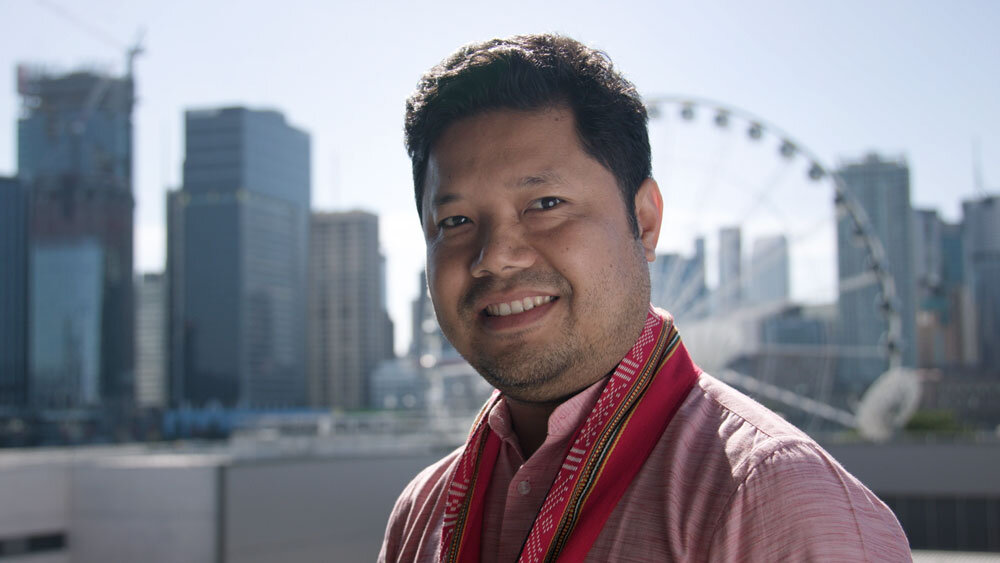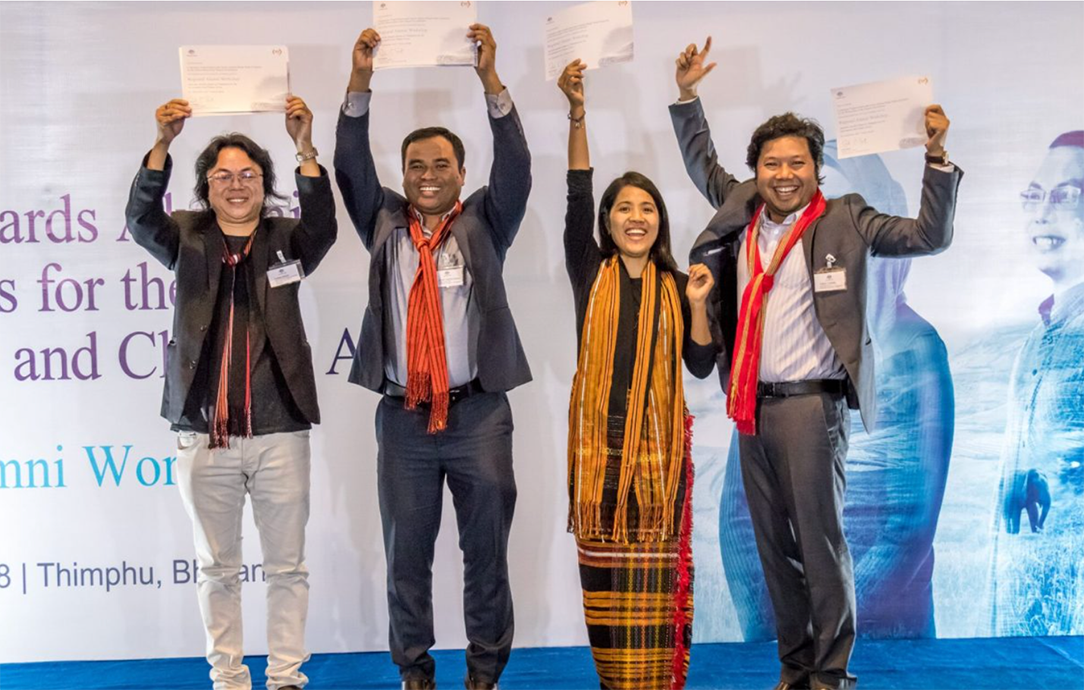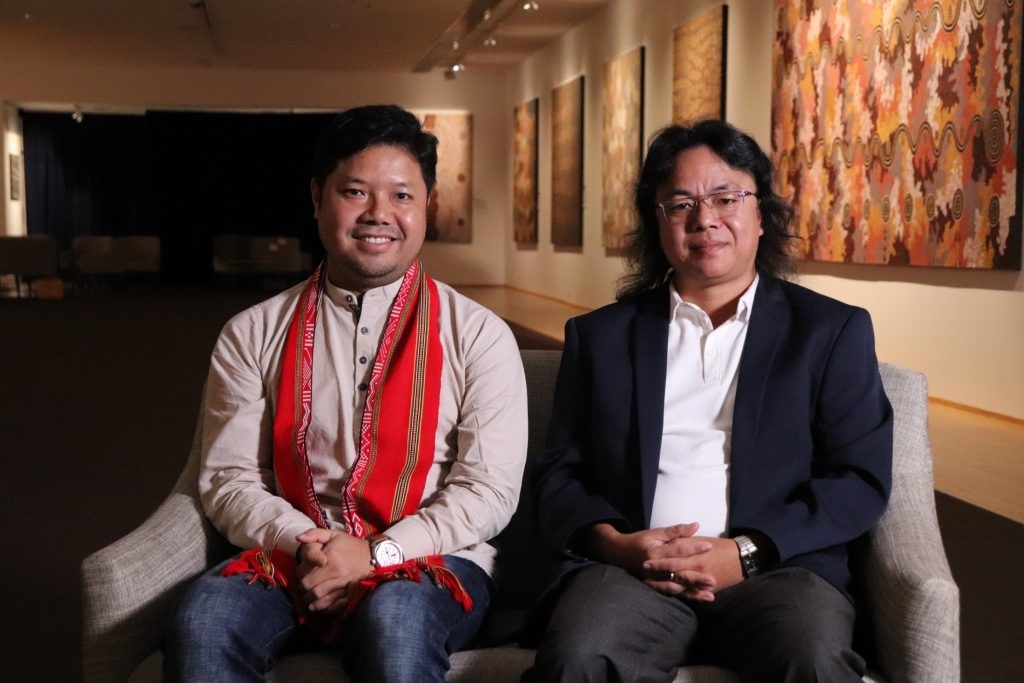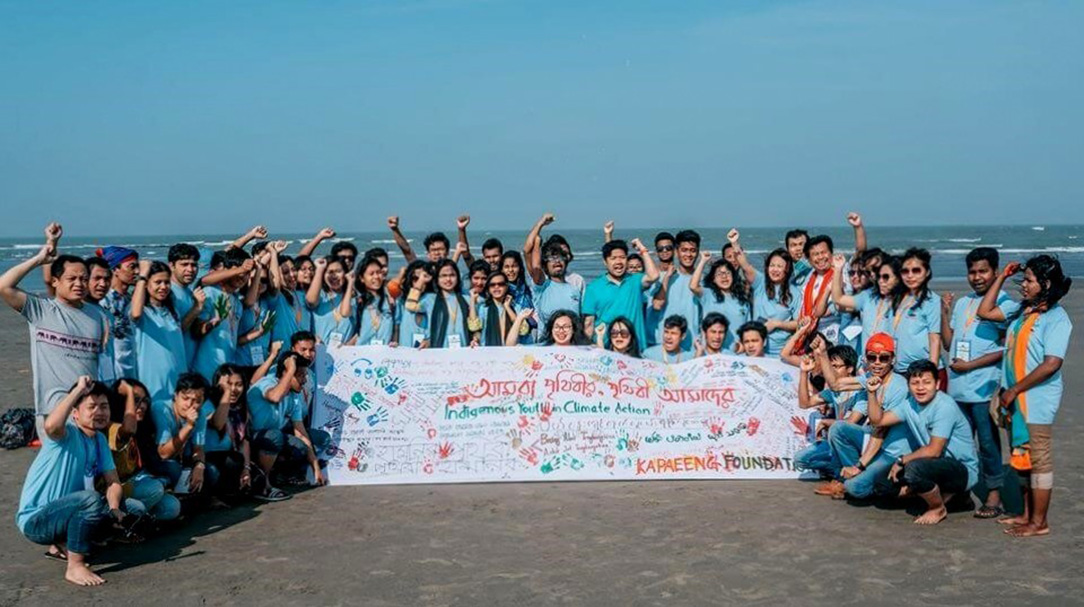04 June 2020

Pallab Chakma
Executive Director, Kapaeeng Foundation
Master of Mediation and Conflict Resolution
Inspired by feature stories produced by the Australia Awards – South and West Asia program: A battle to save the livelihoods of indigenous groups in Bangladesh and Alumni successfully lobby for environmental reforms. Imagery has also been drawn from these sources. Australia Awards are prestigious international Scholarships and Short Courses funded by the Australian Government.
Pallab Chakma’s upbringing in the south-eastern part of Bangladesh amongst the lush green, deep forests and rugged valleys and waterfalls in the Chittagong Hill Tracts (CHT), has shaped both his career and firm strength of character.
Growing up immersed in his indigenous Chakma culture – Village Common Forest (VCF) customs, a traditional practice of collective forest management by the community; Jum cultivation (slash-and-burn agriculture) for growing crops; and the Bizu Festival, a celebration of end of the year and welcoming new year that has its origins in preparing the earth for a generous harvest – all reinforced his connection with his ancestors and their special relationship with the land.
Eleven Indigenous ethnic groups reside in the Chittagong Hill Tracts (CHT), named Chakma, Marma, Tripura, Tanchangya, Mro, Lushai, Khumi, Chak, Khiyang, Bawm and Pangkhua, who collectively all identify themselves as the Jumma people (High Landers who practise Jum cultivation).
“The Jumma people, and a small number of descendants of Assames and Gorkhas, have been living in the Chittagong Hill Tracts for centuries,” says Pallab.
“I belong to the Chakma indigenous group. The largest among the all indigenous groups in this area. We have our own traditional customary land management system and judiciary headed by our Circle Chief. Apart from regular state law, we also practice our customary system of land management and judiciary by our own way.”

Pallab is now a fierce advocate for these indigenous rights and fighting for his community’s equality through his current role as the Executive Director of the Kapaeeng Foundation, a human rights organisation of indigenous peoples of Bangladesh run by indigenous peoples themselves.
He has also made his name with the Bangladesh Indigenous Peoples’ Forum where he holds the position of Assistant General Secretary in the National Committee and is one of the editors of the Annual Human Rights Report of Indigenous Peoples in Bangladesh, a regular report on indigenous peoples’ human rights situations.
The Chittagong Hill Tracts are described by Amnesty International as a little-known place in Bangladesh where great beauty is the backdrop to a sordid brutality.
After decades of displacement and violent conflict, 1997 Chittagong Hill Tracts Peace Accord was signed between Prime Minister Sheikh Hasina’s government and the Jumma people of the CHT over their lands and other administrative issues.
While the Peace Accord ended much of the decades of armed conflict in the troubled region of Bangladesh, many of the issues still persist – including legal recognition by the Bangladesh Constitution, ownership, settlement and their rights to traditional lands, livelihood and culture, military occupation, and the Jumma’s political autonomy – and action to combat these human rights violations have been stifled.
“Indigenous peoples in Bangladesh are discriminated against in many ways. Their traditional lands are being grabbed by influential and majority groups of people. Sometimes they are forcefully evicted from their ancestral land due to implementation of development projects in the name of establishment of tourism complexes, military bases, reserve forests, and eco-parks,” he says.
An Australia Awards participatory mini-documentary co-produced by Pallab Chakma and fellow Australia Awards alumni, highlighting their cause. Credit: Australia Awards - South and West Asia.
“Due to their ethnic identity indigenous peoples often become victims of wage discrimination in some parts of the country, and do not have access to justice especially in the cases of violence against indigenous women.”
“These indigenous peoples in Bangladesh are not even recognised in the country’s constitution.”
Pallab has made it his life’s work to uphold these traditional collective rights over land, territories and resources, to ensure all civil and political rights, and economic, social and cultural rights to protect the vulnerable indigenous peoples in the country.
As Executive Chief of the organisation he leads his team and the wider community through a range of activities to protect their culture and customs including policy advocacy, awareness, capacity building, networking, mobilising funds, research, and community mobilisation.
One of the most successful projects Pallab has been a part of is when last year, he and his fellow Bangladeshi Australia Awards alumni – Janet Naco, Shohel Chandra Hajang and Lelung Khumi – successfully lobbied the country’s Government for legal reforms to stop the pollution of CHT water sources in their indigenous community.
After years of campaigning and community empowerment from the group, the Bangladeshi High Court has directed the involved authorities to immediately stop extraction of stone from Sangu and Matamuhri rivers in Bandarban, and declared the practice illegal.

While there is still lots of work to do, this is a major step in protecting the local Jumma peoples and their homeland, and the dangers that they have been facing concerning access to clean drinking water, the coinciding health issues, and subsequent environmental hazards.
Education has been a significant part of this journey too, as growing up he noticed many people in his community were not aware of their rights and were therefore often unable to contribute in preserving, protecting and developing their traditional culture and customs.
However, he witnessed the influence education had in empowering educated members of the community and galvanising these indigenous groups to protect their rights, so he decided to pursue higher education as well.
“I consider myself lucky that I got this opportunity to contribute in rising the community.”
After earning a Bachelor in International Relations in Bangladesh, he cemented a keen interest in international affairs and politics, and how these structures contributed to conflict, peace, and negotiation.
He then spotted an opportunity to study peace and conflict studies through an Australia Awards Scholarship, formerly known as an Australian Development Scholarship, and immediately applied for it. He was successful in this application, and as a result, landed a place in UniSA’s Master of Mediation and Conflict Resolution program.

After graduating from the University in 2013, and now as Executive Director, Pallab has led the Kapaeeng Foundation through a number of successful programs, however, he still sees his voice as a great privilege.
“Indigenous peoples are one of the most vulnerable groups in the society in respect of enjoying civil and political rights in the country. Therefore, indigenous leaders thought they should have a human rights platform of their own from where they could raise their voices against any kinds of human rights violation perpetrated against indigenous peoples,” he says.
“Now Kapaeeng Foundation is that platform which works for promotion and protection of the rights of indigenous peoples in the country. Being an indigenous rights activist and leading the KF as Executive Director, I am very happy with the work I am doing for my own people.”
“I consider myself lucky that I got this opportunity to contribute in rising up the community.”
“I believe that, if we stand together and fight together, we could bring positive change to our society,” adds Pallab.”
Pallab Chakma & the Kapaeenga Foundation

Under the direction of Pallab Chakma as Executive Director, the Kapaeenga Foundation has spearheaded a number of vital changes for indigenous peoples in Bangladesh. Here he shares some of the projects the group has been involved in and how you can help.
Preserving Indigenous Languages
One of the most challenging jobs for indigenous communities is to protect their own indigenous languages. In CHT, indigenous people speak in diverse indigenous languages. Most of the community have their own language. This is the beauty of their rich culture. However, some of languages have already been identified as endangered languages.
Introducing multilingual education for indigenous children at pre-primary and primary school level is crucial for protecting languages, including the Government publishing textbooks in five indigenous languages. But there’s still a long way to go.
We have to act immediately to protect those languages from extinction.
The fight against illegal stone extraction to preserve the natural environment in Bangladesh
Local indigenous peoples of the Bandarban district in the Chittagong Hill Tracts (CHT), are facing threats to their safe drinking water as their sources of water are being damaged or polluted by illegal stone extraction.
Indigenous peoples used to collect water from the natural pools locally known as ‘Jiri’. But now the ‘Jiries’ are mostly dead leaving only the streambed, which runs several feet beneath the surface. Due to unlimited stone lifting by some powerful syndicates in the district, these water streams are drying up and being polluted.
Stone extraction has been continuing for the past ten years especially from Rui Canal, Tak Canal, Taker Panchhari Jiri, Den Jiri, Tonkaboti Canal under Lohaghara Upazila, Chittagong. But nowadays this process started in Bandarban Sadar, Rowangchhari, Ruma, Thanchi, Ali Kadam and Lama Upazila of Bandarban.
Not only the water but also the environment and biological diversity is getting hampered by over extraction of stones. It’s not a result of climate change, but rather a manmade problem. Therefore, strong community mobilisation and community action is needed to address the issue by engaging with local government agencies and civil society platforms.
Keeping that in mind, we developed our project to mobilise community, engage them with local government authorities, and connect with mainstream civil society organisations, so that they could work together to put pressure – even from the national level – to stop illegal stone extraction from the hilly streams.
Protecting land and community rights
We are implementing several projects for the promotion and protection of the rights of indigenous peoples in Bangladesh. Recently, we have completed one project titled, “Strengthening the network of indigenous peoples’ human rights defenders for the promotion and protection of land rights of indigenous peoples in Bangladesh”. The project was supported by Direct Aid Programme (DAP) of Australian High Commission to Dhaka. Through this project we are building capacities of land rights defenders and supporting their local activities in the community.
We are implementing another project titled “Indigenous Navigator – improving indigenous peoples’ access to justice and development through community-based monitoring and reporting”. The aim of this project is to monitor the progress of SDGs implementation and its reflection in the life of indigenous peoples.
At the same time, we aim to develop community data by engaging community people and compare it with the national data to find out data gaps between our national and community data. This project is supported by the European Union and jointly implemented by International Lobour Organization (ILO).
To find out more about the Kapaeenga Foundation and how you can get involved, visit their website.




